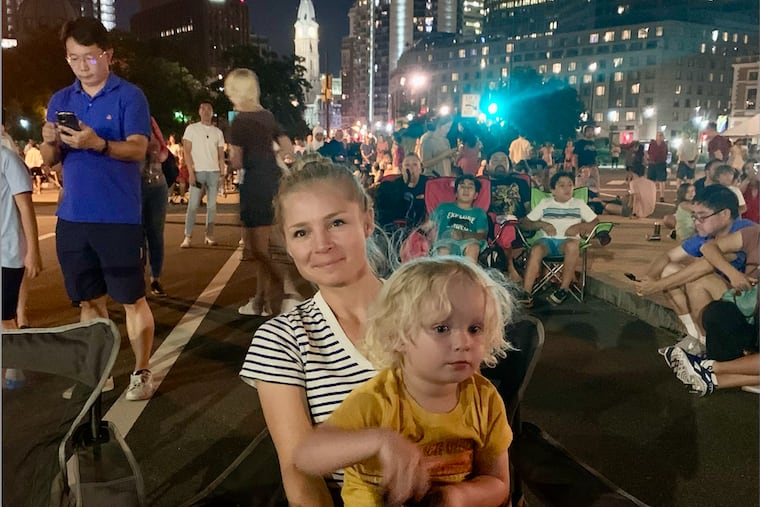On July 4th, my toddler fled from gunfire
When Jack and I sat down on the couch after we got home, he asked me if we could “be safe again when the sun comes up.”

On Monday evening I took my 2-year-old son, Jack, to see fireworks on the Parkway for the first time. But instead of my child remembering the July Fourth fireworks show fondly, as I remember them from my childhood, he remembers it as terrifying. Terrifying not because the fireworks were too big or too bright or too loud, but because there was gunfire.
After two police officers were shot during the event, thousands of onlookers, including us, ran to take cover. I sprinted, in a dress and flips flops, carrying my son as he cried, not sure if I was about to be hit in the head with a bullet, run over by a car, or blown up by a bomb. This is what it is to go to a public celebration in our country now.
As a pediatrician, I am acutely aware of the impacts of gun violence on kids. Gun violence is now the leading cause of death for children in this nation, surpassing all other causes in 2020. Kids come into the emergency department bleeding, shot in the stomach or arm or leg. Children who come into the clinic have lost a mom or a dad, an aunt or an uncle, their families torn apart. Research done here in Philadelphia shows that even being in the vicinity of gun violence increases the likelihood that kids will present to the emergency department with mental health concerns.
It is traumatizing for children to hear gunfire, to have to run, to take cover, to wonder if they’re safe leaving their homes or going to school. We’re creating a country where children don’t feel safe doing the very things that kids are supposed to do.
“We’re creating a country where children don’t feel safe doing the very things that kids are supposed to do.”
On Monday, I learned that even small children internalize this fear. When Jack and I sat down on the couch after we got home, he asked me if we could “be safe again when the sun comes up.” The next morning, when asked at day care how his first fireworks show went, he replied: “It was scary, people were running.” We may be tempted to convince ourselves that children don’t understand what’s going on when these types of events happen, but they do, even as toddlers.
There are many aspects of Monday night that troubled me, but one that I keep coming back to is my own tendency to normalize and downplay the experience. I found myself saying: “Well, only two people were shot, and they survived. It’s not like it was a mass shooting. It’s not like it was Buffalo or Uvalde or Highland Park.” But this is precisely the problem. Gun violence has become so commonplace that we view stampeding away from a Fourth of July celebration as unremarkable or even acceptable, just because no one died.
» READ MORE: Philly police are searching for ‘a clear picture’ of what happened at July 4 shooting on the Parkway
There are those who will say that it’s not about guns, it’s about the people who wield them. That owning guns is an American right. And to that, I say that while we do need to do more to support everyone’s mental health, the experience of so many other countries suggests that fewer guns mean fewer gun deaths. And that if we accept that owning guns is a right, then we must also contend with the fact that protecting this right infringes on so many others, like a child’s right to play in their neighborhood, go to school, and watch fireworks without the threat of being shot.
I applaud Congress for taking a first critical step to reduce gun violence, in the form of the Bipartisan Safer Communities Act. I also ask that this be seen for what it is — the first step and not the only step. Lawmakers must continue to do the hard work to move beyond the politics and toward the commonsense policies that reduce guns, at least to the point that we are not the only country in the world with more guns than people.
Our kids are counting on us.
Zoe Bouchelle is an associate fellow at the Leonard Davis Institute of Health Economics at the University of Pennsylvania. She is a general pediatrician and a mom in Philadelphia.